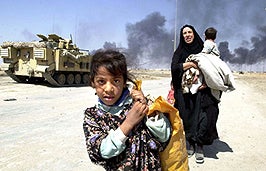 People often ask me what I’m reading. This year, I read a lot of books on politics—and was impressed by a number of important books such as State of Denial, The Looming Tower, and The Audacity of Hope. But my favorite books of 2006 mostly go beyond the bestseller list and include:
People often ask me what I’m reading. This year, I read a lot of books on politics—and was impressed by a number of important books such as State of Denial, The Looming Tower, and The Audacity of Hope. But my favorite books of 2006 mostly go beyond the bestseller list and include:
The Last Week by Marcus Borg and John Dominic Crossan. Borg and Crossan’s careful study of Mark’s account of the Passion is one of the most interesting exegetical treatments of Jesus’ death I’ve ever read. I taught an Introduction to the Bible for several years at an undergraduate college—but Borg and Crossan taught me things I never knew. Especially noteworthy: their exegesis of the “Render unto Caesar” passage and their discussion of Palm Sunday. Some people stereotype Borg and Crossan, but The Last Week breaks through many of those presuppositions. With its passion for personal and political transformation, this book will surprise you.
Leaving Church by Barbara Brown Taylor. This is a wonderful, literary, and tender memoir of the pastoral life—and Ms. Brown Taylor’s eventual exit from her pulpit to become a college professor. It is not, however, a story of loss. Instead, she writes of “leaving church” to find a broader participation in the priesthood of all believers, the “human church,” to which we all belong. She raises some difficult questions—that will upset some readers—in an inviting and intelligent way.
Tempting Faith, by David Kuo. Not only is Kuo’s book an honest assessment of religion in the Bush Administration, but it stands with Chuck Colson’s Born Again and Mark Hatfield’s Between a Rock and a Hard Place as a classic of evangelical spiritual memoir in relation to politics. Kudos to Kuo for both strong content and reinvigorating an important genre in spiritual autobiography.
Mind the Light, by J. Brent Bill. This is not a “big” book. Rather, it is, like Bill’s earlier piece, Holy Silence, a small, gentle take on Quaker spirituality. He walks his readers through a path to encounter God’s light—complete with “illuminating” exercises for individuals and groups. A refreshing book full of good news—especially in contrast to all the darkness in the world today.
Both The Shia Revival by Vali Nasr and The Faith Club by Ranya Idliby, Suzanne Oliver, and Priscilla Warner examine important issues in understanding tensions between Christians, Jews, and Muslims. Although very different, one scholarly (Nasr) and the other deeply personal (Idliby et al), these books move from theory and theology to the impact of religious difference in the contemporary world.
Finally, All Mortal Flesh by Julia Spencer-Fleming is the fifth in her Reverend Clare Fergusson mystery series—and it is clearly the best. Here, the priest-detective becomes a suspect in the murder of her almost-lover’s wife and the narrative is full of ruminations on doubt, sin, and guilt. And the mystery is appropriately grim and grisly with an ending that I never could have guessed. Spencer-Fleming left me breathless waiting for the next installment!
Diana Butler Bass (www.dianabutlerbass.com) is a regular blogger for God’s Politics and a member of the Red Letter Christians. She is the author of Christianity for the Rest of Us: How the Neighborhood Church is Transforming the Faith (Harper San Francisco, 2006), named one of the best of year by Publishers Weekly and Christian Century.

